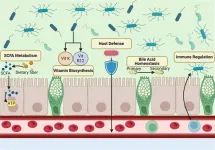(Press-News.org) Stress is a double-edged sword when it comes to memory: stressful or otherwise emotional events are usually more memorable, but stress can also make it harder for us to retrieve memories. In PTSD and generalized anxiety disorder, overgeneralizing aversive memories results in an inability to discriminate between dangerous and safe stimuli. However, until now, it wasn’t clear whether stress played a role in memory generalization.
Now, neuroscientists report November 15 in the Cell Press journal Cell that acute stress prevents mice from forming specific memories. Instead, the stressed mice formed generalized memories, which are encoded by larger numbers of neurons.
“We are now beginning to really understand how stress impacts aversive memories, and I think that's good news for everybody,” says memory researcher and co-senior author Sheena Josselyn of The Hospital for Sick Children (SickKids) and the University of Toronto. “We were able to isolate the synaptic mechanisms that drove this and also show that this same phenomenon can be manipulated or blocked by using systemically available drugs.”
To test whether stress impacts memory specificity, the researchers trained mice to associate one sound with stress, and another sound with no stress. Then, they tested the mice’s ability to react appropriately to the different sounds.
Mice which had been placed in an acutely stressful, controlled experience exhibited defensive behavior regardless of which sound was played to them, suggesting that the stressful experience interfered with their ability to form specific memories. In contrast, control mice who had not been subjected to stress exhibited defensive freezing only in response to original sound.
Because the stressed mice had elevated levels of corticosterone in their blood, the researchers next tested whether corticosterone itself could impact memory formation. They showed that mice that received corticosterone prior to training were also unable to form specific memories to the two sounds, and that administering metyrapone, a chemical that inhibits glucocorticoid synthesis, restored the ability of stressed mice to form specific memories.
Specific memories are encoded by groups of neurons called engrams. Most engrams involve only a few neurons, but the researchers showed that the generalized engrams formed by stressed mice were larger, because inhibitory interneurons—gatekeeping cells that usually keep engrams exclusive—failed to do their job. This change, in turn, was driven by endocannabinoids that were released in the amygdala in response to corticosterone.
“When we manipulated endocannabinoid receptors in just one particular cell type in one brain region, it restored memory specificity and the size of the engram,” says stress researcher and co-senior author Matthew Hill of the University of Calgary. “This whole phenomenon is mediated by a very discrete microcircuit in the amygdala, but you can do a systemic pharmacological manipulation and still prevent it, which is very encouraging from the perspective of whether this could one day be translated for therapeutic use in humans.”
In future, the researchers want to investigate whether stress also impacts the specificity of non-aversive memories. They also plan to examine whether exogenous cannabinoids (e.g., cannabis) would have a similar effect on memory specificity, which could have implications for PTSD management.
“We only examined aversive threat memories, but it would be interesting to examine whether stress similarly increases the generalization of a rewarding memories,” says memory researcher and co-senior author Paul Frankland, also at SickKids and the University of Toronto.
“Given that this phenomenon involved the activation of endocannabinoid receptors, it would be very interesting to see if a stoned animal shows a similar generalization response,” says Hill. “That's one of the things that I'd be curious to quickly run as a follow up, because if it did, that would have some interesting implications given that the whole conversation that exists right now around cannabis and PTSD is very confusing.”
###
This research was supported by the Dutch Research Council, Niels Stensen Fellowship, ZonMw Memorabel, Canadian Institutes of Health Research, Alzheimer Nederland, Toronto Cannabis and Cannabinoid Research Consortium, and the Brain Canada Foundation.
Cell, Lesuis et al., “Stress disrupts engram ensembles in lateral amygdala to generalize threat memory in mice” https://cell.com/cell/fulltext/S0092-8674(24)01216-9
Cell (@CellCellPress), the flagship journal of Cell Press, is a bimonthly journal that publishes findings of unusual significance in any area of experimental biology, including but not limited to cell biology, molecular biology, neuroscience, immunology, virology and microbiology, cancer, human genetics, systems biology, signaling, and disease mechanisms and therapeutics. Visit http://www.cell.com/cell. To receive Cell Press media alerts, contact press@cell.com.
END
PHILADELPHIA—Debate continues to swirl nationally on the fate of a practice born of an 86-year-old federal statute allowing companies to pay workers with disabilities subminimum wages: anything below the federal minimum wage of $7.25 an hour, but for some roles as little as 25-cents-per-hour. Those in favor of repealing this statute highlight assumptions about reduced productivity along with the unfairness of this wage level—often used elsewhere to pay, for example, food service workers who typically make additional wages in tips. Those against repeal have voiced concerns that, without subminimum ...
EMBARGOED: NOT FOR RELEASE UNTIL FRIDAY 15 NOVEMBER 2024 AT 11:00 ET (15:00 UK TIME).
Researchers are calling for a ‘resilience index’ to be used as an indicator of policy success instead of the current focus on GDP.
They say that GDP ignores the wider implications of development and provides no information on our ability to live within our planet’s ‘safe operating space’.
In a paper published today [15 November] in the journal One Earth, researchers from the University of Southampton, UCL ...
Researchers at The Hospital for Sick Children (SickKids) have uncovered that stress changes how our brain encodes and retrieves aversive memories, and discovered a promising new way to restore appropriate memory specificity in people with post-traumatic stress disorder (PTSD).
If you stumble during a presentation, you might feel stressed the next time you have to present because your brain associates your next presentation with that one poor and aversive experience. This type of stress is tied to one memory. But stress from traumatic events ...
A team of researchers from McGill and Université de Montréal’s Observatoire pour l’éducation et la santé des enfants (OPES, or observatory on children’s health and eduation), led by Sylvana Côté, found that spending two hours a week of class time in a natural environment can reduce emotional distress among 10- to 12-year-olds who had the most significant mental health problems before the program began.
The research comes on the heels of the publication of a UNICEF ...
mRNA vaccines saved lives during the COVID-19 pandemic, but older people had less of an immune response to the vaccines than did younger adults. Why? Boston Children’s researchers, led by Byron Brook, PhD, and Ofer Levy, MD, PhD, have found some answers, while providing proof-of-concept of a new system that can model vaccine responses in a dish.
The test system, described in a paper out today in iScience, is called MEMPHIS (Modular Evaluation of immunogenicity using Multi-Platform Human In vitro Systems). It analyzes whole human blood from people of different age groups and applies both proteomics and targeted assays to measure ...
More time spent sitting, reclining or lying down during the day may increase the risk of cardiovascular disease (CVD) and death, according to a study in JACC, the flagship journal of the American College of Cardiology, and presented at the American Heart Association’s Scientific Sessions 2024. More than roughly 10-and-a-half hours of sedentary behavior per day was significantly linked with future heart failure (HF) and cardiovascular (CV) death, even among people meeting recommended levels of exercise.
“Our findings support cutting back on sedentary time to reduce cardiovascular risk, with 10.6 hours a day marking a potentially key threshold ...
XI’AN, CHINA [November 15, 2024] — The National Comprehensive Cancer Network® (NCCN®)—an alliance of leading cancer centers in the United States—is taking part in the Fourth International Congress of the Asian Oncology Society and the Chinese Congress on Holistic Integrative Oncology (2024 CCHIO) sponsored by the China Anti-Cancer Association (CACA), Chinese Institute of Development Strategy on Holistic Integrative Medicine, and Asian Oncology Society (AOS). The three-day event highlights international collaborations to improve cancer treatment and outcomes across China and beyond.
“NCCN ...
FROM: James Urton
University of Washington
206-543-2580
jurton@uw.edu
(Note: researcher contact information at the end)
Hunted nearly to extinction during 20th century whaling, the Antarctic blue whale, the world’s largest animal, went from a population size of roughly 200,000 to little more than 300. The most recent estimate in 2004 put Antarctic blue whales at less than 1% of their pre-whaling levels.
But is this population recovering? Is there just one population of Antarctic blue whales, or multiple? Do these questions matter for conservation?
A team led by Zoe Rand, a University of Washington doctoral student, tackles these questions ...
A group of South Korean researchers has decided to utilize AI technology to support customer counseling services. Through this, it will provide a significant boost to the performance and efficiency of counselors in various industries, while improving the overall quality of customer counseling services, ultimately making it easier to meet the customers’ needs and expectations while opening up the possibility for realizing new values.
Electronics and Telecommunications Research Institute (ETRI) announced that ...
The gut microbiome, an ecosystem of trillions of microorganisms in the human digestive tract, has been increasingly linked to chronic diseases. Research led by Dr. Connor Prosty and his team at McGill University consolidates recent findings that demonstrate a causal role for the gut microbiome in the progression of multiple diseases, ranging from gastrointestinal conditions to immune-related and psychiatric disorders. Published in eGastroenterology, this narrative review examines how manipulating the gut microbiome ...

